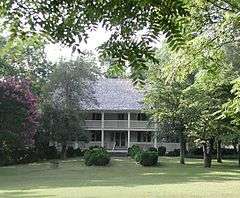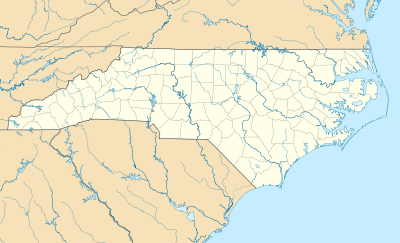Carson House (Marion, North Carolina)
|
Carson House | |
 | |
  | |
| Location | 1805 Highway 70 West Marion, North Carolina |
|---|---|
| Coordinates | 35°41′30″N 82°03′27″W / 35.69167°N 82.05750°WCoordinates: 35°41′30″N 82°03′27″W / 35.69167°N 82.05750°W |
| Area | 2 acres (0.81 ha) |
| Built | c. 1810 |
| NRHP Reference # | 70000843[1] |
| Added to NRHP | September 15, 1970 |
The Carson House is a historic house and museum located in Marion, North Carolina that was the home of Col. John Carson, and served as the McDowell County courthouse at the county's inception.
Built in 1793, The Carson House is one of the oldest standing structures in Marion along with the nearby Joseph McDowell House. Large walnut logs were harvested from nearby Buck Creek to construct the massive three-story plantation house. Between 1804-1827, the area now known as McDowell County was a large producer of gold, and people from all over the country came to "strike it rich" before the California Gold Rush of 1849. The 1843 meeting to formally organize McDowell County out of the counties of Burke County and Rutherford County took place in the home of Col. John Carson, and the county was named after Col. Joseph McDowell, the hero of the American Revolution at the Battle of King's Mountain. Originally, the county commissioners wanted the county seat to be located around the Carson House, but concerns about disrupting plantation life led to the Carson family donating 50 acres (200,000 m2) a few miles east for the county seat.[2] Col. John Carson's son Joseph McDowell Carson, built Green River Plantation near Columbus, Polk County, North Carolina.[3]
For many years, The Carson House served as a stagecoach inn and social center, and was a stopping point for important historical figures such as Davy Crockett, Sam Houston, and Andrew Jackson, who reportedly lost money gambling on the horses that raced at the Carson Plantation.[4] Dan Kanipe, one of only two survivors of General Custer's unit in the Battle of Little Bighorn lived in Marion, and spent some years living at the Carson House.
It was listed on the National Register of Historic Places in 1970.[1]
After extensive renovations, the house was opened to the public as a museum and library in 1964. The Carson House maintains a unique collection of research materials and books, along with dozens of family histories in its library. The Mary M. Greenlee Genealogical Research and History Room has been a part of the house since the early 1970s, and is constantly adding to its archives.[5] Today, The Carson House is listed on the National Register of Historic Places, and is open to the public as a museum. In 2007, it was listed as a certified destination on the NC Civil War Trail.
References
- 1 2 National Park Service (2010-07-09). "National Register Information System". National Register of Historic Places. National Park Service.
- ↑ J. G. Zehmer and Sherry I. Penny (June 1970). "Carson House" (pdf). National Register of Historic Places - Nomination and Inventory. North Carolina State Historic Preservation Office. Retrieved 2015-02-01.
- ↑ Survey and Planning Unit Staff (October 1973). "Green River Plantation" (pdf). National Register of Historic Places - Nomination and Inventory. North Carolina State Historic Preservation Office. Retrieved 2015-02-01.
- ↑ "McDowell Chamber of Commerce". Retrieved 2009-02-12.
- ↑ "Historic Carson House". Retrieved 2009-02-12.
External links
- Historic American Buildings Survey (HABS) No. NC-144, "Carson House, U.S. Route 70, Marion, McDowell County, NC", 3 photos
- Historic Carson House – Marion, North Carolina , Historic Site
- McDowell Chamber of Commerce – Marion, North Carolina
- City of Marion, NC

